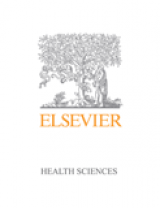This unique manual provides comprehensive, yet practical and easily accessed advice on the key issues of asthma management in both adult andpaediatric patients. The second edition will continue to help all those involved with the care of asthmatic patients to apply the recently updated international guidelines. It combines vital information on how to tackle practical, clinical issues, whilstat the same time highlighting essential basic sciences to aid diagnosis, management and treatment.
New to this edition
Expanded sections on acute and chronic asthma in children written by international paediatric respiratory expertsUse of icons in margins to highlight the most recent drugs and therapies
New larger format, with an eye-catching design aids easy access to key information
Key Features
Provides solutions to day-to-day clinical problems in asthma managementClear, concise and practical advice helps the reader to clarify asthma severity and select appropriate treatment plans
Diagrams illustrate the stepwise approaches to asthma managementEach chapter concludes with a list of summary points
Author Information
By Paul M. O'Byrne, MB, FRCPI, FRCPC, Professor, Department of Medicine, Head Division of Respiratory Medicine, McMaster University, Hamilton, Ontario, Canada and Neil Thomson, Professor, Department of Respiratory Medicine, West Glasgow Hospitals University Trust, Glasgow, Scotland, UK
EPIDEMIOLOGY AND PATHOGENESIS OF ASTHMA
1 Definition, classification, epidemiology and risk factors
2 Natural history
3 Pathogenesis
DIAGNOSIS AND INVESTIGATIONS OF ASTHMA
4 Triggers of asthma
5 Diagnosis in children
6 Diagnosis in adults
7 Pulmonary function tests
8 Provocation tests
9 Investigations of allergy
10 Examination of sputum, exhaled gases and nasal cytology
11 Bronchoalveolar lavage and bronchial biopsies
ASSESSMENT AND TREATMENT OF ASTHMA
12 Assessment of asthma control: symptoms, drug use, PEF, severity
13 Assessment of asthma control: quality of life
14 Assessment of asthma control: markers of inflammation
15 Primary prevention of asthma
16 Secondary allergen avoidance measures
17 Corticosteroids
18 Anti-allergic drugs
19 Immunosuppressive agents
20 Mediator antagonists and other new agents
21 Bronchodilators
22 Delivery systems
23 Immunotherapy
24 Other forms of treatment
25 Patient education
26 Self-management plans
27 Assessment of compliance
MANAGEMENT OF ASTHMA
28 General principles
29 Management of chronic asthma in children
30 Management of acute asthma in children
31 Management of chronic asthma in adults
32 Management of acute asthma in adults
33 Specific problems: occupational asthma
34 Specific problems: asthma induced by aspirin and other non-steroidal anti-inflammatory drugs
35 Specific problems: allergic bronchopulmonary aspergillosis
36 Specific problems: exercise-induced asthma
37 Specific problems: nocturnal asthma
38 Specific problems: asthma in pregnancy and pre-menses
39 Specific problems: corticosteroids resistant asthma
40 Specific problems: psychological factors
41 Specific problems: gastro-oesophageal reflux and asthma
42 Specific problems: cough
43 Specific problems: chronic rhinosinusitis and asthma
44 Specific problems: food allergy in asthma
45 Specific problems: difficult asthma
46 Specific problems: steroid-induced side effects
47 Acute complications of asthma
48 Chronic complications of asthma
RUNNING AN ASTHMA SERVICE
49 Primary care
50 Hospital practice
51 Audit in asthma
52 Economics of asthma


